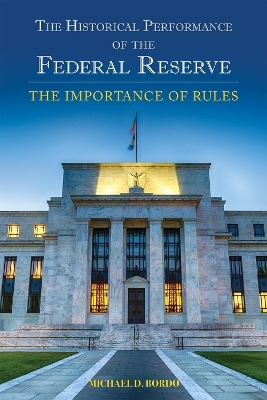
The Historical Performance of the Federal Reserve
The Importance of Rules
Seiten
2019
Hoover Institution Press,U.S. (Verlag)
978-0-8179-2214-6 (ISBN)
Hoover Institution Press,U.S. (Verlag)
978-0-8179-2214-6 (ISBN)
Distinguished economist Michael Bordo argues for the importance of monetary stability and monetary rules, offering theoretical, empirical, and historical perspectives to support his case. He shows how the pursuit of stable monetary policy produces low and stable inflation, stable real performance, and encourages financial stability.
Distinguished economist Michael D. Bordo argues for the importance of monetary stability and monetary rules, offering theoretical, empirical, and historical perspectives to support his case. He shows how the pursuit of stable monetary policy guided by central banks following rule-like behavior produces low and stable inflation, stable real performance, and encourages financial stability. In contrast, he explains how the failure to adhere to rules that produce monetary stability will inevitably produce the dire consequences of real, nominal, and financial instability.
Bordo examines theoretical perspectives in monetary theory on the case for stable money and the importance of monetary rules. The author also looks at the historical and empirical record of economic performance (both inflation and real output) across policy regimes. He examines the performance of the Federal Reserve in its pursuit of discretionary monetary policy, and he reviews the history of monetary policy during the Great Depression.
Distinguished economist Michael D. Bordo argues for the importance of monetary stability and monetary rules, offering theoretical, empirical, and historical perspectives to support his case. He shows how the pursuit of stable monetary policy guided by central banks following rule-like behavior produces low and stable inflation, stable real performance, and encourages financial stability. In contrast, he explains how the failure to adhere to rules that produce monetary stability will inevitably produce the dire consequences of real, nominal, and financial instability.
Bordo examines theoretical perspectives in monetary theory on the case for stable money and the importance of monetary rules. The author also looks at the historical and empirical record of economic performance (both inflation and real output) across policy regimes. He examines the performance of the Federal Reserve in its pursuit of discretionary monetary policy, and he reviews the history of monetary policy during the Great Depression.
Michael D. Bordo is currently Board of Governors Professor of Economics and director of the Center for Monetary and Financial History at Rutgers University. He is also a Distinguished Visiting Fellow at the Hoover Institution at Stanford University.
| Erscheinungsdatum | 19.06.2019 |
|---|---|
| Verlagsort | Stanford |
| Sprache | englisch |
| Maße | 152 x 229 mm |
| Gewicht | 1161 g |
| Themenwelt | Wirtschaft ► Volkswirtschaftslehre ► Finanzwissenschaft |
| ISBN-10 | 0-8179-2214-8 / 0817922148 |
| ISBN-13 | 978-0-8179-2214-6 / 9780817922146 |
| Zustand | Neuware |
| Haben Sie eine Frage zum Produkt? |
Mehr entdecken
aus dem Bereich
aus dem Bereich
eine Einführung in die Staatsfinanzen
Buch | Hardcover (2024)
Vahlen (Verlag)
39,80 €
New Foundations
Buch | Softcover (2022)
Edward Elgar Publishing Ltd (Verlag)
64,75 €
and why it doesn't work the way we think it does
Buch | Softcover (2023)
Pan Books (Verlag)
13,70 €


